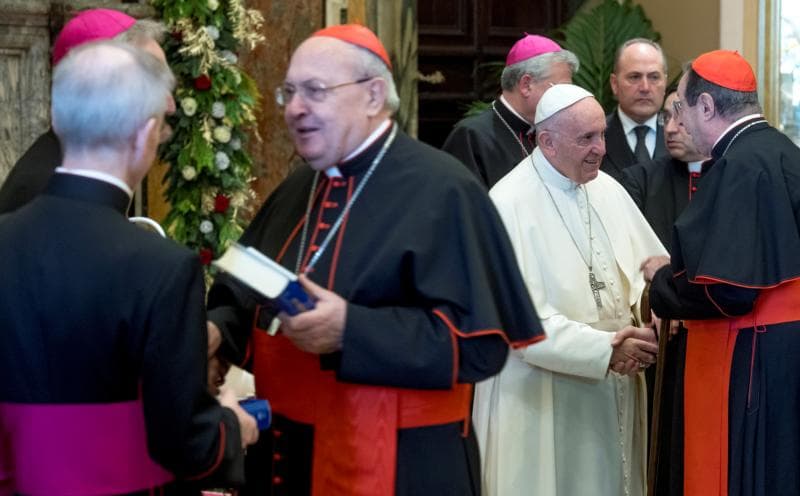ROME — Updating the norms and regulations governing the resignation of bishops and of Roman Curia department heads who are not cardinals, Pope Francis said they will continue to hold office until he accepts their resignations.
The update was published in a document titled Imparare a congedarsi (“Learning to say farewell”) and was given “motu proprio,” meaning on the pope’s own initiative. The new rules went into effect Feb. 15, the same day it was released by the Vatican press office.
The Code of Canon Law previously stated that a resignation that requires acceptance “lacks all force if it is not accepted within three months” while one that does not require acceptance “takes effect when it has been communicated by the one resigning.”
However, the pope said that after consultation, he “became aware of the need to update the norms regarding the times and methods of resignation from office upon reaching the age limit.”
Under the new norms, “the acceptance or extension, for a specified or unspecified amount of time, is communicated to the person” resigning.
The ending of a Church assignment, the pope wrote, “must be considered an integral part of the service itself, in that it requires a new form of availability.”
“This interior attitude is necessary both when, for reasons of age, one must prepare to leave office and when they are asked to continue that service for a longer period despite reaching the age of 75,” Francis wrote.
Those preparing to retire, he said, must also prepare themselves “adequately before God, stripping themselves of the desire for power and the presumption of being indispensable.”
“This will allow us to cross this moment with peace and confidence which otherwise could be painful and conflictual,” the pope wrote.
Francis also updated the norms involving the resignation of heads of dicasteries of the Roman Curia who are not cardinals.
In a document published in 2014, the pope stated that “non-cardinal heads of dicasteries in the Roman Curia, the secretaries and bishops who fulfill other offices of pontifical nomination forfeit their office on the completion of their 75th year.”
Now, the pope decreed, bishops and prelates heading offices in the Roman Curia still must offer their resignations at 75, but whether they leave or not is up to the pope who “will decide evaluating the concrete circumstances.”
The updated rules for non-cardinal heads in the Roman Curia are similar to the 1983 Code of Canon Law and the 1990 Code of Canons of the Eastern Churches, which already required most bishops to submit their resignations at the age of 75.
The request for bishops and prelates to go beyond their mandate, however, should “not be considered a privilege or personal triumph, or as a favor due to presumed obligations derived from friendship or closeness, nor as gratitude for the efficiency of services provided,” Francis said.
“This pontifical decision is not an automatic act but an act of governance,” the pope wrote. “Consequently, it implies the virtue of prudence that will help, through adequate discernment, to make the right decision.”













